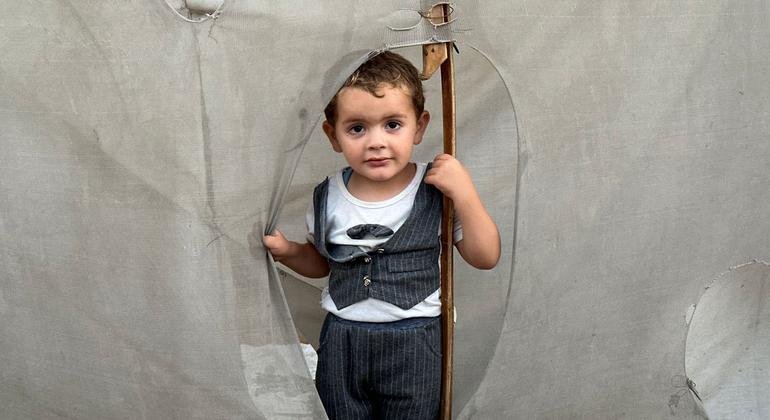Louise Waterridge, spokeswoman for the United Nations Palestinian Refugee Agency, UNRWA, said: “It is essential that we stop the polio outbreak in Gaza before more children are paralyzed and the virus spreads.” “We need to accelerate the vaccination campaign in the north through the implementation of a humanitarian moratorium.”
To stop transmission, at least 90 per cent of all children in every community and neighborhood must receive their second dose, following the relative success of the first vaccination last month.
Transporting vaccines to the Gaza Strip. In the Gaza Strip, United Nations agencies and partners aim to immunize more than 640,000 children against polio, which was eradicated 25 years ago but reemerged during the war.
Polio vaccination campaign thwarted
The third and final phase of the operation, which was scheduled to begin more than 24 hours ago across the north, has been postponed due to escalating violence, heavy shelling, mass evacuation orders and a lack of a credible humanitarian pause. I had to.
“The current situation, including continued attacks on civilian infrastructure, continues to jeopardize the safety and movement of people in northern Gaza, making it difficult for families to safely take their children for vaccinations and for medical workers to “It makes it impossible for people to operate,” Waterridge said.
The effort aimed to vaccinate around 120,000 children across the North.
Since the launch of the second polio campaign on 14 October, 442,855 children under the age of 10 have been successfully vaccinated in south-central Gaza Strip, reaching 94% of the target number in these areas. .
A rapidly worsening “nightmare”
“The nightmare in northern Gaza is intensifying,” warned UNRWA’s Ms. Waterridge. “For nearly three weeks, we have repeatedly warned that tens of thousands of civilians are at grave risk from ongoing military operations.”
More than 400,000 people remain trapped in the north, where Israel has stepped up attacks as Hamas militants are regrouping there.
A UNRWA spokesperson said people in the north were experiencing extreme suffering with “appalling levels of death, injury and destruction”.
“Civilians are trapped under rubble, the sick and injured are without life-saving medical care, families lack food, their homes are destroyed, there is no shelter, and nowhere is safe.”
Gaza deaths to be ‘live-streamed’
For three weeks, no food or aid has arrived in the north, and there are no markets or stores to sell food.
Military attacks have also cut off access to essentials for survival, such as water.
Eight wells in the UNRWA medical hub in the north and in Jabalia are out of service and the fuel to run water systems has run out, forcing people to risk their lives just to find drinking water. .
UNRWA and the World Food Program (WFP) facilitated the passage of a food convoy to Gaza City on October 15, but the Israeli siege has prevented food from reaching the local population for the past three weeks, he said. The UNRWA team is ready, he added. We provide services at shelters, but we need supplies to do so.
“There is a huge sense of frustration among displaced families in northern Gaza as they face what they describe as fear as their death and suffering is being broadcast live,” she said. “We are receiving desperate pleas from our colleagues and friends in northern Gaza.”
The war in Gaza has resulted in an unprecedented number of attacks on United Nations facilities and personnel. (file)
Attacks on UNRWA personnel and facilities
At least 232 UNRWA personnel have been killed and more than 200 facilities damaged or destroyed in Gaza, and a bill in the Israeli parliament calls for a halt to operations in the occupied Palestinian territories, the UN agency’s chief Philippe Lazzarini said on Thursday. stated at the meeting. Held in Paris on the escalation of the Lebanese crisis.
“The failure to effectively resist attempts to intimidate and undermine the United Nations has set a dangerous precedent,” he warned.
He stressed that these attacks are not limited to UNRWA, calling them “an attack on our common multilateral system.”
“A renewed commitment to multilateralism and common values, enshrined in the United Nations Charter, must guide our response in Lebanon and across the region,” Lazzarini said.

